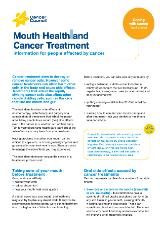- Home
- Head and neck cancers
- Managing side effects
- Mouth problems
Mouth problems
Some cancer treatments cause mouth sores and ulcers and saliva changes, which make eating difficult. But there are ways to manage this.
Learn more about:
Mouth sores and ulcers
A common side effect of chemotherapy and radiation therapy, these are called oral mucositis. They form on soft tissue in your mouth and make eating, swallowing and talking hurt. They usually go away as you recover from treatment.
Your doctor can give you medicines to reduce the pain when you eat, drink or speak. Some pain medicines can be applied directly to the mouth sores to numb them. You may use more than one type of medicine to control the pain.
Keep your mouth clean during treatment to lessen the risk of infection. Alcohol-free mouthwashes help keep your mouth as clean as possible.
Ask your speech pathologist and dietitian what to eat to help with any pain. You may find soft, smooth or cooler foods and nourishing fluids are best. If you can’t eat and drink enough, you may need a feeding tube to support you during treatment and recovery.
Dry mouth
Radiation therapy to the head or neck area and surgery that affects the salivary glands can reduce the amount of saliva in your mouth, make your mouth dry or make your saliva thick and sticky. This is known as xerostomia and is often long-lasting. Xerostomia can make chewing, swallowing and talking difficult.
A dry mouth can also make it harder to keep your teeth and mouth clean, and can increase the risk of tooth decay. Be careful to keep your mouth and teeth clean and have regular dental checks.
For more on this, see Mouth health and cancer treatment.
How to relieve mouth problems
Mouth sores and ulcers |
Dry mouth |
|
|
→ READ MORE: Taste, smell and appetite changes
Podcast for people affected by cancer
Listen now
A/Prof Martin Batstone, Oral and Maxillofacial Surgeon and Director of the Maxillofacial Unit, Royal Brisbane and Women’s Hospital, QLD; Polly Baldwin, 13 11 20 Consultant, Cancer Council SA; Martin Boyle, Consumer; Dr Teresa Brown, Assistant Director Dietetics, Royal Brisbane and Women’s Hospital, Honorary Associate Professor, University of Queensland, QLD; Dr Hayley Dixon, Head, Clinical Support Dentistry Department, WSLHD Oral Health Services, Public Health Dentistry Specialist, NSW; Head and Neck Cancer Care Nursing Team, Royal Melbourne Hospital, VIC; Rhys Hughes, Senior Speech Pathologist, Peter MacCallum Cancer Centre, VIC; Dr Annette Lim, Medical Oncologist and Clinician Researcher – Head and Neck and Non-melanoma Skin Cancer, Peter MacCallum Cancer Centre, VIC; Dr Sweet Ping Ng, Radiation Oncologist, Austin Health, VIC; Deb Pickersgill, Senior Clinical Exercise Physiologist, Queensland Sports Medicine Centre, QLD; John Spurr, Consumer; Kate Woodhead, Physiotherapist, St Vincent’s Health, Melbourne, VIC; A/Prof Sue-Ching Yeoh, Oral Medicine Specialist, University of Sydney, Sydney Oral Medicine, Royal Prince Alfred Hospital, Chris O’Brien Lifehouse, NSW.
View the Cancer Council NSW editorial policy.
View all publications or call 13 11 20 for free printed copies.
